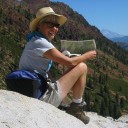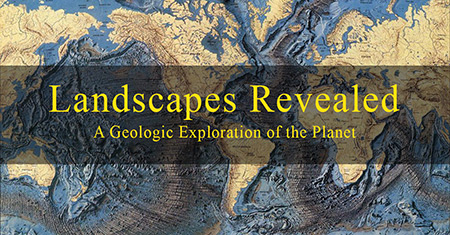The glacier that marches to its own drummer
As you are probably aware, most of the glaciers in the world are retreating (getting smaller). For example, in Glacier National Park in Montana, the glaciers are expected to be completely gone in the next decade or two. In Argentina's glacier park (Parque Nacional Los Glaciares), most glaciers are also retreating. But not the Perito Moreno glacier. It steadfastly continues...
On the road
Having spent 8 hours today traveling from Puerto Santa Cruz on the Atlantic coast to El Calafate on the edge of the Andes, it seems a fitting time to evoke Jack Kerouac's book (On the Road) and reflect on traveling options. The sites in Patagonia are spectacular but the distances between them are large. How best to travel between them?...
Darwin marveled at the terraces and gravel, and so do we
We are now at 50 degrees latitude, at the lovely little town of Puerto Santa Cruz, located on the south bank of Rio Santa Cruz not far west of where it empties into the Atlantic Ocean. In 1834, during his voyage on the Beagle, Darwin entered this river and traveled up it until he could see the cordillera (the Andes)....
The flood with unexpected consequences (it fossilized plants!)
West of Comodoro Rivadavia, a prosperous but mostly unattractive town devoted to the petroleum business, is the village of Sarmiento. Most of Patagonia is a desert with low-growing bushes and long vistas. Between C. Rivadavia and Sarmiento, one is reminded of Texas, with oil wells (here referred to as penguinos - penguins!) on a relatively featureless landscape (affectionately referred to...
Our favorite critters and don’t forget that plants make fossils too
Almost a million penguins - even a geologist has to be impressed by the quantity, not to mention the silly antics, of these crazy flightless birds. We went to Punta Tombo where at least 250,000 mating pairs have made burrows in the sediment - they return each year to give birth and raise their young (called pichons) before they all...
Some of the critters went extinct (fossils!)
This province (Provincia Chubut) is super rich in life forms. But even more diverse than the organisms living today are those that have gone extinct. From east (near the coast) to west (near the Andes), sedimentary deposits are progressively older and have fossils from the Cenozoic (age of mammals), Mesozoic (age of reptiles, including dinosaurs), and Paleozoic (old life, including...
Critterlandia
Peninsula Valdéz is at 42 degrees (Buenos Aires is at 34 degrees) so the days are longer - it's not dark until about 9). For those of you who know the Point Reyes Peninsula, where I've done geologic research, there are some surprising similarities. A narrow strip of land extends seaward and ends at coastal cliffs that are uplifted marine...
Join me for a trip to the end of the world!
El fin del mundo—the end of the world! Only the southern tip of South America dares poke its head south into the 40-55° latitudes where the planet's strongest winds—the West Wind Drift—drive the planet's strongest current—the Circum-Antarctic Current. In this wind-swept part of the world, the stark yet stunning landscapes take their character from a base of amalgamated crustal blocks...
- « Previous
- 1
- 2
About the Blogger
 Karen (here with Mt. Shasta in background) is a geology professor emerita who aims to provide a "pocket geologist" for world travelers. Follow the blog to explore the landscapes of our planet and figure out what causes them to look the way they do.
Karen (here with Mt. Shasta in background) is a geology professor emerita who aims to provide a "pocket geologist" for world travelers. Follow the blog to explore the landscapes of our planet and figure out what causes them to look the way they do.









